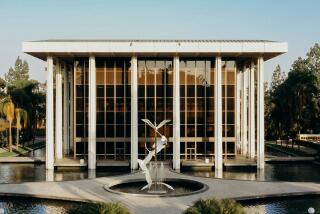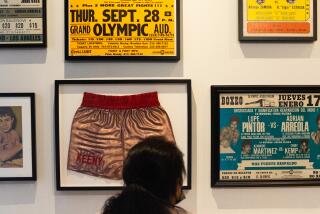And Then There Was Silence in Pasadena : Commentary: Despite social and religious oddities, Ambassador made a generous contribution to our cultural life.
- Share via
It began in April, 1974, as a lavish socio-aesthetic fluke.
Herbert Armstrong, self-appointed messiah of wealthy, ultra-conservative and unaccredited Ambassador College and patriarch of the sponsoring Worldwide Church of God, was opening his own pink-onyx-and-gold-leaf shrine in Pasadena. He compared it, with characteristic modesty, to the Parthenon.
Most of the time, the 1,200-seat hall would serve the community as a temple of art. Between Friday night and sundown on Saturday, it would serve the so-called Anglo-Israelites as a temple of religion.
According to an emphatically capitalized program note, Ambassador Auditorium had been “made possible by special gifts from members of the Worldwide Church of God as a monument to the honor and glory of THE LIVING GOD.” A massive media ministry had not elicited tithes in vain.
The inaugural event was a concert by the second-rate Vienna Symphony Orchestra, brought all the way from Austria for a one-night stand. An Ambassador insider expressed some surprise when informed that the Vienna Symphony wasn’t the same ensemble as the Vienna Philharmonic . At least the conductor was world class: Carlo Maria Giulini.
Initially, Ambassador Auditorium was to be a venue for charitable fund-raising. Although ticket prices would be very high, contributions would be tax-deductible. The beneficiaries were to include Armstrong’s own charities as well as some outside institutions. Attractions ranged from established superstars such as Horowitz and Rubinstein to promising local talents.
The separation between church and art wasn’t quite complete. Artists were discouraged from performing certain kinds of sacred music, and certain religious texts could not be printed in the program. A modest production of “Tosca” had to proceed with all Catholic artifacts deleted from the scenery. Nothing so vulgar as a box office was permitted on the sacred ground (driven from the temple, money-takers sold--and still sell--tickets in a nearby office building).
The programming avoided anything that might seem dangerously modern as well as anything that might offend delicate moral sensibilities. This, after all, was a campus where “co-eds” could not wear make-up and students were forbidden to hold hands in public.
Eventually, cooler heads began to prevail. Armstrong died and the Ambassador International Cultural Foundation seemed to evaporate. Admission prices were normalized. The college moved to Texas. Antagonists began to tire of accusing the church of trying to purchase respectability via the lofty muses.
A symbol: Coffee--once regarded as an unnecessary evil--was actually dispensed on the plaza near the splashy fountains.
One could note lapses, such as a recent unholy alliance with a potentially disreputable piano competition. Still, most patrons in the ‘90s were taking the conspicuous consumption and artistic ostentation for granted as they concentrated on the music. And the music often was as wonderful as money could buy.
Ambassador’s sophisticated booking agents hired the biggest and the best. They knew that they commanded the finest hall in the area for recitals, for chamber music, for any event predicated on intimacy.
Now, we are told, the money has run out. In May, Ambassador will close its ornate doors. The Worldwide Church of God “has suffered declining income . . . (and) reluctantly must cease funding the arts.”
The funding must have been extremely generous. Many a major artist asks a performance fee of $60,000. One doesn’t have to be a mathematical genius to know how much it takes to break even with such a figure as a starting expense. Alternate sources of income are unlikely at a time when a Gingrich threatens to steal Christmas.
Glamorous Ambassador may have been created to do the right deed for the wrong reason. Perhaps it was too rich to be true. Still, the cumulative achievements were vast. If the loss really is permanent, it will be felt far beyond that strange, empty campus in Pasadena.
More to Read
The biggest entertainment stories
Get our big stories about Hollywood, film, television, music, arts, culture and more right in your inbox as soon as they publish.
You may occasionally receive promotional content from the Los Angeles Times.










